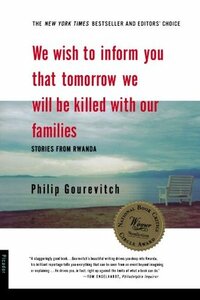You need to sign in or sign up before continuing.
Take a photo of a barcode or cover
651 reviews for:
We Wish to Inform You That Tomorrow We Will Be Killed with Our Families
Philip Gourevitch
651 reviews for:
We Wish to Inform You That Tomorrow We Will Be Killed with Our Families
Philip Gourevitch
The book provides a lot of context to the situation in Rwanda, particular in the aftermath of the Genocide and the situation in the refugee camps, as well in the relationship with neighboring countries. It's a great complement to People Betrayed (by Linda Melvern). Needless to say, Rwanda was - on purpose, by paralysis or simply ignorance - overlooked, abandoned and ignored by many countries that could've helped.
A magnetic, chilling and intimate account of one of the most barbaric atrocities in history. A genocide of as many 1,000,000 Rwandans, carried out by their fellow Rwandans, and largely delivered by machete, club and fist. Gourevitch unflinchingly details how the West not only stood by and watched, but went on to misguidedly aid the killers after the event. A devastating read, but told with remarkable skill and humanity.
dark
emotional
sad
fast-paced
Good history of the Rwandan genocide but author is self indulgent and insensitive at times.
challenging
dark
informative
reflective
slow-paced
Extremely informative and helpful in disentangling some of the interwoven conflict in central Africa in the 90s, which, as a US schoolkid at the time, was just presented as a hopelessly tangled web of violent chaos. The first half of the book focused on Rwanda itself - Rwanda’s history and ethnic culture that led up to the genocide plus the events of the genocide. I felt like it brought a lot of clarity to my (previously lacking) understanding as an outsider, and I was especially shocked and dismayed to learn of the UN and US’s roles in allowing it to happen. The 2nd half of the book focused on the aftermath of the genocide, including the influences of other African countries and western influences. It felt less focused and less sure of itself than the 1st half, and I had a harder time staying invested in it as a result. There were fewer personal accounts and more reporting of events, and because we were trying to move from topic to topic and country to country rationally, the timeline was no longer linear. It was confusing at parts, and frustrating at others. Granted, Gourevitch was dealing with really difficult topics (e.g. how do you execute justice for perpetrators of genocide?) - but for such deep topics being discussed, I felt they were only briefly mentioned in essentially a laundry list of post-genocidal issues, and I was left feeling like not only were the questions unanswered, but Gourevitch had just gotten tired and stopped looking into them. Regardless, I’m coming out of this experience feeling much better informed, even less happy with my country than I already was, and with very little hope for humanity and world relations as a whole.
Admirable reportage. But not without issues (but then again a book without issues is boring). Is moral ambivalence really a “useless notion”? Twenty years on “We Wish to Inform You” raises questions on the tricky aspects of history (i.e it’s not finished and stories of protagonists/antagonists could be recast in a better or worse light) and of journalistic reportage (can someone be really objective).
-
Case in point Paul Kagame. His nuanced portrait of this polarizing “strong man” (see: current authoritarian rule, and catastrophic war in DRC not to mention the controversial conclusion of a long investigation implicating him as the mastermind of the assassination of Juvénal Habyarimana and Cyprien Ntaryamira) raised eyebrows. In 2017 he was elected with 99% of the vote (like the 1978, 1983, and 1988 election wins for Habyarimana).
-
As I was reading the book, a notification from Al Jazeera on my phone: Hotel Rwanda film hero Paul Rusesabagina held on terror charges (a well-known critic of Kagame). Surreal.
-
And the role of the west. France backed off (was supporting the Habyarimana government), the US was indifferent, the UN ignored Dallaire’s proposals, etc.
-
In the end, this book made me incredibly sad (the violence humans are capable of) and angry (politicians’ disregard of human lives, the weaponization of ethnic frictions, the indifference, callousness in the name of geopolitics). Also what about Kagame now?
-
Case in point Paul Kagame. His nuanced portrait of this polarizing “strong man” (see: current authoritarian rule, and catastrophic war in DRC not to mention the controversial conclusion of a long investigation implicating him as the mastermind of the assassination of Juvénal Habyarimana and Cyprien Ntaryamira) raised eyebrows. In 2017 he was elected with 99% of the vote (like the 1978, 1983, and 1988 election wins for Habyarimana).
-
As I was reading the book, a notification from Al Jazeera on my phone: Hotel Rwanda film hero Paul Rusesabagina held on terror charges (a well-known critic of Kagame). Surreal.
-
And the role of the west. France backed off (was supporting the Habyarimana government), the US was indifferent, the UN ignored Dallaire’s proposals, etc.
-
In the end, this book made me incredibly sad (the violence humans are capable of) and angry (politicians’ disregard of human lives, the weaponization of ethnic frictions, the indifference, callousness in the name of geopolitics). Also what about Kagame now?
the positionally that this is written from is my main critique here, particularly the privilege of whiteness and the detached gaze in talking about the survivors and victims of the genocide that took place.
What is it about New Yorker writers that makes them so good at writing nonfiction -- sometimes, in this case, the most horrifyingly real nonfiction -- and pulling something insightful, universal, and extraordinary out of it?
A really hard read. Heart wrenching, but important to get through.
Well-reported and moving. Gourevitch largely blames the inaction of the international community, and then its post-genocide support of Hutu-run militarized refugee camps. Written in 1999, it's a time capsule of thought on the conflict -- which is this book's limitation.
Paul Kagame, depicted here as a reformist VP, is now president and a much more ambivalent figure to the international community due to suspect elections, increased domestic repression, and suspected involvement in high-profile political assassinations. A new book from 2021 by Michela Wrong seeks to create a corrective to general positive pro-Kagame feeling -- and further complicates the issue by (critics say) both-sidesing the genocide.
Obviously, you can't tell from a single book almost a quarter century ago how political developments proceeded. So I went digging, and found that opinions are vastly divided on Rwanda today, largely split between Francophone and Anglophone spheres. Even once-heroic figures like Paul Rusesabagina have been accused of terrorism and espionage by Kagame.
I looked on Twitter to see what Gourevitch thinks today. He appears to take Kagame's word for Rusesabagina's alleged crimes and has longstanding feuds with Kagame-critical voices. There's also a very active Rwandan Twitter community that has various factions and hated characters within it, which I spent an evening investigating. A recent anti-Kagame op-ed in the NYT received quite a lot of pushback, for example.
It seems that the thing to do is to seek out more recent writing on Rwanda -- and see where those voices situate themselves.
I do think this is a useful book for a primer on the genocide but will seek out
1) primary sources that center Rwandans!
2) more recent long form reporting and analysis.
Paul Kagame, depicted here as a reformist VP, is now president and a much more ambivalent figure to the international community due to suspect elections, increased domestic repression, and suspected involvement in high-profile political assassinations. A new book from 2021 by Michela Wrong seeks to create a corrective to general positive pro-Kagame feeling -- and further complicates the issue by (critics say) both-sidesing the genocide.
Obviously, you can't tell from a single book almost a quarter century ago how political developments proceeded. So I went digging, and found that opinions are vastly divided on Rwanda today, largely split between Francophone and Anglophone spheres. Even once-heroic figures like Paul Rusesabagina have been accused of terrorism and espionage by Kagame.
I looked on Twitter to see what Gourevitch thinks today. He appears to take Kagame's word for Rusesabagina's alleged crimes and has longstanding feuds with Kagame-critical voices. There's also a very active Rwandan Twitter community that has various factions and hated characters within it, which I spent an evening investigating. A recent anti-Kagame op-ed in the NYT received quite a lot of pushback, for example.
It seems that the thing to do is to seek out more recent writing on Rwanda -- and see where those voices situate themselves.
I do think this is a useful book for a primer on the genocide but will seek out
1) primary sources that center Rwandans!
2) more recent long form reporting and analysis.



